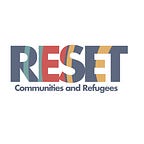How I passed my driving tests in English less than 1 year after arriving in the UK
Abdullah arrived in the UK as a Syrian refugee in 2017 with only a few words of English. 10 months later, he had passed his theory and practical driving tests, giving him vital independence and freedom and allowing him to continue his job as a key worker during the coronavirus pandemic.
Gordon East, founder of CHARIS, set up the Community Sponsorship Group which sponsored Abdullah and his family. In this blog, we’ve transcribed a chat between Gordon and Abdullah as they share tips for refugees looking to pass their driving tests in the UK and for the people supporting them to do so.
Gordon: You passed your driving test 10 months after arriving in the UK. Why was it so essential that you pass your driving test within your first year here?
Abdullah: I’d driven in Syria for many years. When I arrived in the UK, I had a valid Syrian driving licence. Under UK law, I was allowed to continue driving in the UK using my Syrian licence for 1 year. If I wanted to continue driving after that point, I needed to obtain a UK driving licence. We live in a small town in the UK and I very quickly realised that I needed a car. There’s not much public transport beyond the town centre here.
During the coronavirus pandemic, having a car has enabled me to get to work safely. I’m a key worker and if I wasn’t able to drive, I don’t know how I would have been able to keep working.
G: What challenges did you face to get a driving licence?
A: The biggest challenge was the language barrier. The theory test has more than 1000 questions and you have to take the test in English. A lot of the vocabulary in the theory test is very specific! The other barriers were affording lessons and being able to understand the examiner in the practical test.
G: Let’s start with the theory test. How much did you study?
A: 2 months after I arrived, I began studying 3 hours a day at least 3 days a week for around 3 months. What really helped me was a resource that CHARIS Community Sponsorship Group purchased from ABEL Drive for Life which enabled me to read the questions in English and then listen in Arabic while I studied. The resource costs around £25 and was really worthwhile. I also did practice tests.
I passed the theory test second time around. It really helped during the test to wear headphones and listen to the questions as well as read them. This way if I didn’t recognise a word written down, I might understand it when I heard it. You have to request in advance if you want to listen to the test as well as read it. I’d definitely recommend this to anyone who’s still learning English. To be clear — you can only listen to the test in English, not your first language.
G: So next you moved on to thinking about your practical test. You said that you’d driven in Syria for many years. Was it important for you to get lessons here?
A: Yes absolutely. Everything is different about the roads here. It’s not just that you’re on the other side of the road (although this was one of the hardest things to get used to!) — it’s that all the rules and signs are different. Having an instructor was essential.
G: How did you choose an instructor?
A: CHARIS Community Sponsorship Group looked around to find an instructor who had experience of teaching people who were still learning English. This was really helpful.
G: In Syria you drove a manual car but you took an automatic test here. Why was that?
A: The practical test requires you to understand the examiner’s instructions. It also now requires you to understand instructions in English from a sat nav. If English isn’t your first language, this is tricky and requires a lot of concentration. Obviously, the most important thing when you’re driving is to keep your eyes on the road. I decided it would be best to take my test in an automatic car so that all I had to think about was understanding the instructions and looking out for hazards. My plan is to take the manual test in a couple of years once I’m really fluent in English and I’m completely used to the roads here.
G: How many hours of lessons did you have and how long did it take you to pass?
A: I had 12 hours of lessons. Driving lessons are not cheap so CHARIS applied for a grant from Goldman Sachs for £500 which covered all the lessons and tests. I’d really recommend seeing what help is out there.
G: What were the most useful ways that CHARIS helped you?
A: In addition to the grant from Goldman Sachs, the resource from ABEL Drive for Life that translated the theory test questions was particularly helpful. But maybe the most important thing was that you kept encouraging me. I was very determined to pass, but it’s easy to get bit down sometimes. You always told me to keep going.
G: Is there anything you’d like to add?
A: To other refugees, remember that you will need to commit to this seriously and study hard. If you do the work, it’ll pay off. Don’t get down if you don’t pass first time, just keep working hard.
Access more advice in our Driving in the UK resource on our Training Website.
CHARIS represents Reset in the South West of England and co-hosts the Lead Sponsor Network with us.
